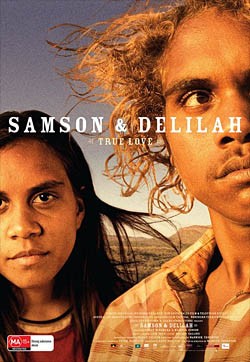 Samson & Delilah, the Cannes-selected breakthrough feature of writer/director Warwick Thornton, follows the gradual partnership of two indigenous teenagers who live in a small impoverished rural community outside Alice Springs. It is a film of slow and menacing beauty, phlegmatically unravelled with painfully authentic performances delivered in front of vast and vacuous backdrops soaked up like a sponge by Thornton’s wide and searching lens.
Samson & Delilah, the Cannes-selected breakthrough feature of writer/director Warwick Thornton, follows the gradual partnership of two indigenous teenagers who live in a small impoverished rural community outside Alice Springs. It is a film of slow and menacing beauty, phlegmatically unravelled with painfully authentic performances delivered in front of vast and vacuous backdrops soaked up like a sponge by Thornton’s wide and searching lens.
It is a stunning achievement and one of the least sentimental boy-meets-girl films you will ever see, period. The first shot is a harbinger of things to come – a long and steady take depicting Samson’s (Rowan McNamara) morning ritual of waking up, reaching for his trusty tin and taking a long, deep whiff of petrol. On this uneasy note the film’s harsh but seductive mood begins.
In opening scenes romantic chemistry between 15-year-old Samson and 16-year-old Delilah (Marissa Gibson) consists largely of the characters throwing rocks at each other, but give it time and a close affinity between themselves and the audience develops. Samson lives near a trio of reticent musicians who endlessly rehearse a handful of simple riffs, more out of routine than pleasure, and Delilah cares for her elderly grandmother – a wizened, giggly old gal who spots romance well before it blossoms. Our protagonists seem drawn to each other organically, their partnership presented as a natural progression born more of necessity than desire. Eventually they will leave their isolated community and venture to the big smoke, and this is when the film really takes off, the second half carrying a heaviness built on top of the commonplace details illustrated in the first.
Beautiful, heartbreaking and technically proficient, Samson & Delilah is the cinematic event many Australians have waited decades to see: an extraordinarily powerful picture that frames the debate about Aboriginal living standards in an intensely personal context, without loading up on cheap shocks or political didacticism. It is easily comparable to the best films made about indigenous Australians including Nicolas Roeg’s Walkabout and Fred Schepisi’s The Chant of Jimmie Blacksmith. Both of those films were made by white fellas in the 70’s. A film as personal as Samson & Delilah, which seems to spring from the grass roots of contemporary Aboriginal society, needed to come from the inside and Warwick Thornton was the man to do it.
The title characters build enormous screen presence despite very little dialogue and few moments of overt emotion; they are stolid personalities the audience come to understand over time. Rowan McNamara and Marissa Gibson appear naturalistic and effortless and their acting unconsciously nuanced. Together they create the kind of painfully real performances that has critics, for a good reason, choking themselves on superlatives. In addition the handful of ensemble cast are a memorable bunch: Delilah’s Grandma and a friendly hobo who goes by the name of Gonzo bring a little humour and light to the story, though some audiences will inevitably describe it as too much of a downer.
2009 has already been a particularly strong year for Australian films, with titles such as Mary and Max, The Combination and My Year Without Sex more than satisfying the itch for local talent. A few more years like this and critics start using crazy words to express their elation – words like ‘new wave’ and ‘renaissance.’ We can only hope.
Samson & Delilah’s Australian theatrical release date: May 7, 2009







Crikey is committed to hosting lively discussions. Help us keep the conversation useful, interesting and welcoming. We aim to publish comments quickly in the interest of promoting robust conversation, but we’re a small team and we deploy filters to protect against legal risk. Occasionally your comment may be held up while we review, but we’re working as fast as we can to keep the conversation rolling.
The Crikey comment section is members-only content. Please subscribe to leave a comment.
The Crikey comment section is members-only content. Please login to leave a comment.